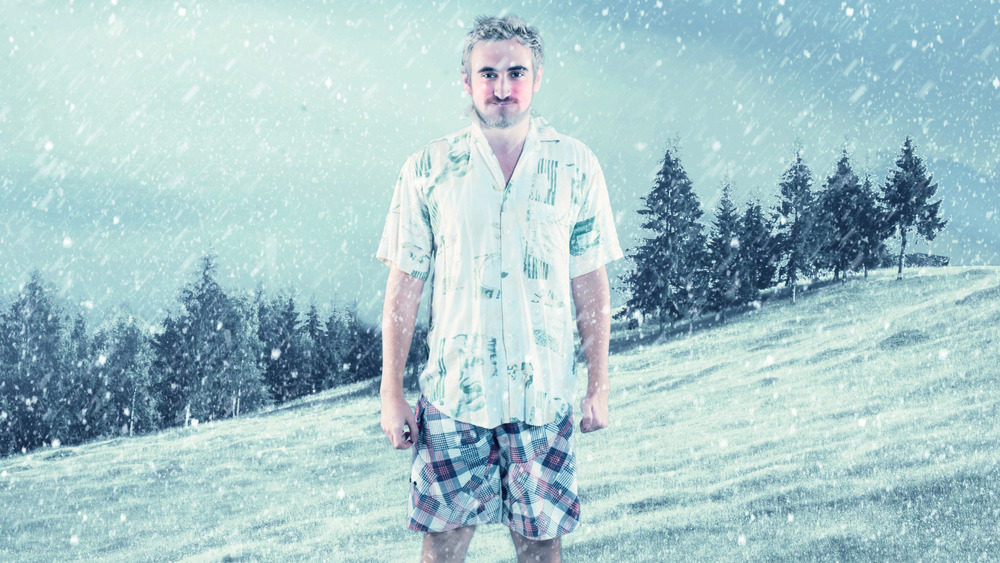Why Some People Just Don't Get Cold
You're wrapped in a blanket on top of a sweatshirt over thermal underwear — and you're still cold. Meanwhile your significant other is parading around in shorts and T-shirt. What's going on? You're tempted to think it's because he's a man and you're a woman (possibly, but we'll get to that later). However a new study out of Sweden, where everyone should be cold, says the difference in whether or not we feel cold is due to a gene mutation.
Here's the background: Our muscles are made up of two different kinds of fibers: fast-twitch and slow-twitch. Fast-twitch muscle fibers help us move fast, with sudden bursts of energy, but tire quickly. Slow-twitch muscle fibers move more slowly, giving us endurance and long-lasting energy, according to Healthline.
Fast-twitch fibers are also more vulnerable to cold because of a specific protein found only in these fibers (per The Ladders). Surprisingly, nearly 20 percent of the global population (about 1.5 billion people) don't have this protein in their bodies, due to a gene mutation. These people are therefore much more resistant to cold weather and are better at keeping warm, and, energy-wise, at enduring a tougher climate, according to co-author Hakan Westerblad, professor of cellular muscle physiology at the Department of Physiology and Pharmacology, Karolinska Institutet.
What researchers found after dunking people in cold water
In the study, published in The American Journal of Human Genetics, the researchers asked 42 healthy men between the ages of 18 and 40 to sit in 57-degree water until their body temperature dropped to 95.9 degrees. While immersed, the participants were given tests that recorded the electrical activity in their muscle tissue. The results of those tests, as well as muscle biopsies performed to identify fiber type, showed that the men whose muscles didn't have the specific protein maintained their body temperature more efficiently. Men with the protein in their muscles shivered, while those without were cool with (i.e., unbothered by) the cold water.
The researchers say this gene mutation increased when early humans migrated from warm Africa to colder Europe, and offered an evolutionary advantage to those who could better withstand the climate.
So now that we understand what causes some people to shiver and some people to be unfazed by low temperatures, you may wonder if there is a way to increase your ability to withstand the cold if you appear not to possess the gene mutation? There just might be.
How not to get cold
You may have noticed that those who wear T-shirts and shorts in February tend to be men. Science agrees. That's because "men in general are going to have a bit more muscle mass than women, so this helps them stay a little warmer," Christopher Minson, professor of human physiology at the University of Oregon, explained to The Guardian. Greater muscle mass increases the metabolic rate, which is the capacity to burn food for energy. The by-product of that is heat. Men have a metabolic rate 23 percent higher than women's, and therefore produce more body heat.
Good news for the perpetual shiverer! It's possible to train yourself to better withstand lower temperatures. Minson suggests turning the shower to cold for 15 seconds, then, once you've adjusted, blasting it for 30 seconds, and up until you can tolerate it for one minute. Minson claims that after a month or two of this, he was less cold when he was in cold environments.
If you find you become chilly while sitting and working, try exercising before you sit down. Minson says this could keep you warmer for about two hours. Moreover, the benefit of exercise is two-fold: It raises your body temperature in the short term and, over time, it increases muscle mass, which would lead to a higher metabolic rate and more body heat.
Eating is another way to feel warmer, as it raises the metabolic rate during digestion. To generate heat, stick to fats and proteins, which produce more heat than easily digestible sugars.
Sweating yet?



